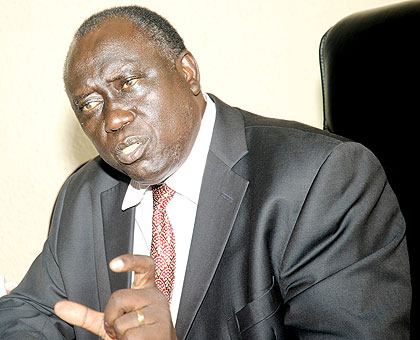In negotiations to bring Genocide trials to Rwanda, government faced difficulties and thus had to, where necessary, give up on smaller matters so as to get out of a stalemate, Justice minister and Attorney General Tharcisse Karugarama told lawmakers on Wednesday.


In negotiations to bring Genocide trials to Rwanda, government faced difficulties and thus had to, where necessary, give up on smaller matters so as to get out of a stalemate, Justice minister and Attorney General Tharcisse Karugarama told lawmakers on Wednesday. He was tabling the draft organic law repealing the 2007 law on transfer of cases to Rwanda from the International Criminal Tribunal for Rwanda (ICTR), other states or international criminal tribunals, and another modifying the 2007 organic law on abolition of the death penalty. Karugarama said: "When you are negotiating, there are things you forego so as to obtain other bigger things. Those who play the game of chess know the pieces called pawns. When you let your opponent take two meaningless pawns and you take the queen, you are at an advantage,” he said. "We made compromises so they can give us these people [Genocide suspects] from foreign jurisdictions since no country would give them to us when there was a death penalty,” Karugarama added. The Chamber of Deputies unanimously supported the basis for repealing the Bills, but MPs Gabriel Semasaka and Jean Damascene Murara queried what they said appeared to be acts by government "to please foreigners” as well as double standards in dealing with Genocide suspects. Article 2 of the Bill on abolition of the death penalty says a convicted person in a case transferred to Rwanda from the ICTR or from other jurisdictions shall not be liable to life imprisonment with special provisions, while one convicted from Rwandan courts could get life imprisonment. Murara said: "If people who committed the same crime get dissimilar punishments, is that justice? It seems as if we are modifying many things to please foreigners, yet Rwanda is a sovereign country.”The minister acknowledged the ‘legal contradictions,’ but said it is how the law has been; only that it is just being modified to conform to the Constitution.New Bills’ underlying principle The Bill dealing with the transfer of cases to Rwanda is being repealed to conform to a constitutional obligation that requires it to be made an ordinary law.Articles 93 and 202 of the Constitution stipulate that Organic Laws are only those envisaged by the Constitution and those not provided for shall be converted into Ordinary Laws within a period not exceeding three years from June 17, 2010.Concerning the draft organic law modifying the 2007 law on abolition of the death penalty, Karugarama said a constitutional obligation is again being respected."When we abolished the death penalty, we introduced a replacement which is either life imprisonment with special provisions, or life imprisonment, simple. That is why we were modifying it so that we conform to the provisions of the Constitution,” Karugarama said.The change assures ICTR and other international jurisdictions that suspects transferred to Rwanda shall not be sentenced to "life imprisonment with special provision.”


